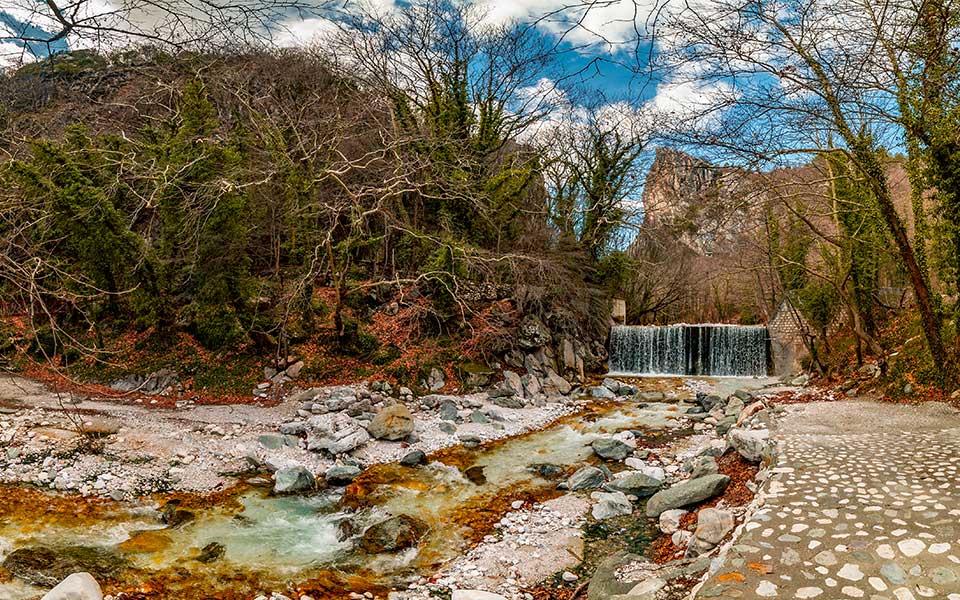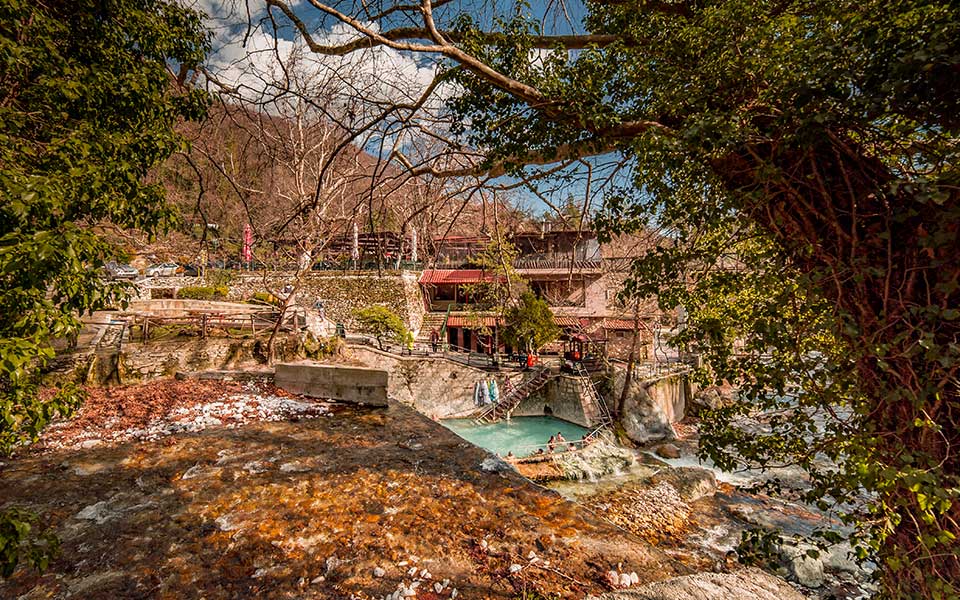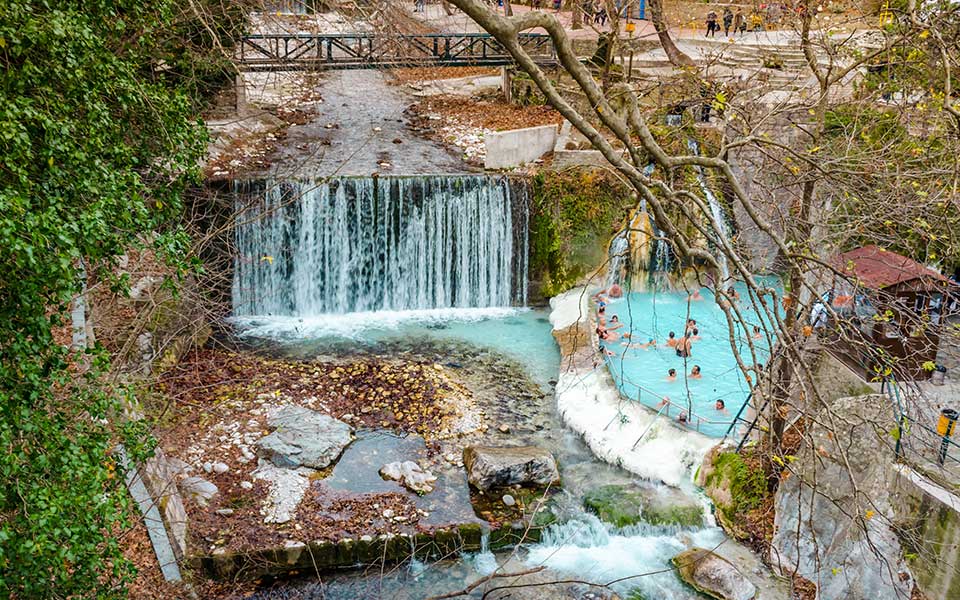Once, after a memorable night out in Thessaloniki with a group of friends, instead of going home to sleep we did something that turned out to be much more sensible. We drove just under two hours to a gorge in the foothills of Mt Kaimaktsalan. There, in the dawn light, we slipped into a thermal pool at Pozar.
Dense steam rose into the winter air, as therapeutic water pounded our shoulders from above. A luminous white river flowed below. The air was intoxicating, enlivened by the cold waterfall beside us. The stresses – and excesses – of urban living were washed clean away. My skin felt as soft and smooth as an infant’s. The spring was more restorative than the best night’s sleep.

© Shutterstock
For couples and for groups of friends like us, the baths are a popular and wholesome alternative to a nightcap; the indoor private baths operate 24 hours a day, and can remain full almost throughout the night, especially on weekends. Everyone, from splashing infants to more sedate seniors, enjoys Pozar. A year-round destination, it attracts a mainly younger crowd on daytrips and over the weekends in the cooler months. In the summer, older patrons often come for stays of a week or two.
Pozar, which means “beneath the fire” in Slavic, is nature at its most luxurious, combining rugged beauty with pure sensual pleasure. The next time I visited, I explored its rugged side first, hiking through the forested gorge. There are trails to suit every ability level, starting with a flat paved path following the Thermopotamos River. Here and there, I climbed up the stone stairs that line the gorge’s wall, finding thrillingly high viewing platforms. Another, wilder trail follows the river further upstream (maps are available at the hydrotherapy center).
After the hike, a massage sounded ideal. Massage centers are located right by the baths, and their services enhance the bathing experience. Enjoyed beforehand, a therapeutic massage optimizes the effectiveness of the waters, as balneotherapist Anestis Samaras, of Saman Relax Center, explained: “The beneficial elements you find in therapeutic waters also exist in our blood. For an element from the water – like magnesium, for example – to become effective, it has to unite with the magnesium already in our bloodstream. A massage dilates the blood vessels, facilitating the absorption of the minerals. It also enhances circulation, directing blood flow to where it’s most needed – to a sprain, for instance – and concentrating the minerals’ healing properties there.”
My full body treatment started with my face; I could feel the tension slip away. The massage was vigorous, almost achingly blissful. Then, at last, it was time for the waters.
HEALING WATERS
- Apart from being so relaxing, Pozar’s water contains elements proven to be beneficial for specific health issues:
- Potassium – essential for cellular function and the muscular and digestive systems.
- Sodium – maintains the balance of fluids and the transmission of nerve impulses.
- Manganese – has antioxidant properties, aids digestion and supports bone health.
- Magnesium – a lack of magnesium is associated with diabetes, cardiovascular diseases and hypertension.
- Silicon – facilitates the enrichment of bones with calcium and other metals, essential for preventing osteoporosis.
- Fluoride – beneficial to the teeth and helpful to those suffering from osteoporosis.
- Iron – iron deficiency can cause anemia, fatigue, tachycardia and breathlessness
- Lithium – used in the treatment of manic episodes and bipolar disorder.

© Shutterstock
Measuring 25m by 12.5m and 1 to 3m deep, the outdoor swimming pool offered room to stretch out after the massage. At 37°C, the water was ideal on a cold day – cozy, but not so warm as to leave me limp. From here, I walked over to the bathing area under the waterfall to let the cascade work its magic.
At just a few euros each, enjoying both pools is an affordable indulgence. But perhaps the best thing to do at Pozar is free. At the river’s edge are shallow manmade thermal pools. Upstream, there’s a spot that offers the thrill of showering in the adjacent cold waterfall first, a local custom. It tightened my skin, toughened my character and made the thermal pool more pleasurable still.
Listening to the rushing water and gazing at the trees, I surrendered to the complete solitude, leaving only when I realized I was famished. Pozar has a good restaurant, serving traditional dishes with quality local ingredients. A glass of wine went quickly to my head; I imagined my lowered tolerance to be evidence of the water’s purifying effects.
Neighboring Loutraki has many guesthouses and small hotels, but there are also a few simple rooms on site. The sound of the river lulled me into a deep sleep. I woke refreshed at daybreak and went straight to the pool in a bathrobe.
It was tranquil, almost empty. Soon afterwards, I would set out for a much longer hike along the river, then enjoyed another swim and a good lunch. Just 24 hours in Pozar left me profoundly recharged, body and soul.
GETTING THERE
Pozar, Loutraki, Pella, is 110km (two hours) from Thessaloniki, 32 km from Edessa and 38km (an hour) from the Voras-Kaimaktsalan Ski Center.












